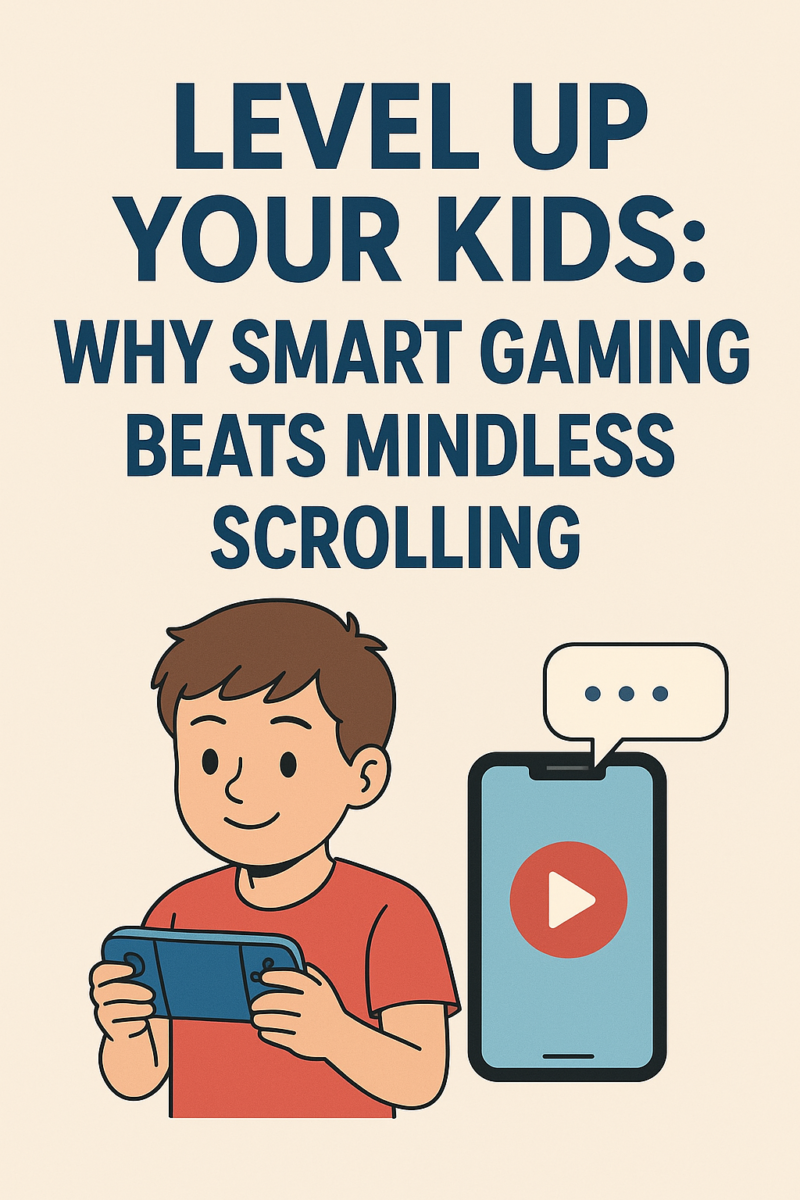In the digital age, screen time is an undeniable part of childhood. But not all screen time is created equal. While many parents understandably worry about the allure of glowing rectangles, there’s a crucial distinction to be made between the passive consumption of social media and the active engagement of well-chosen video games.It’s time for parents to shift their perspective and actively teach their kids how to game, not just as a pastime, but as a powerful tool for skill development.
The Passive Scroll Trap: A Cognitive Black Hole
Let’s be honest: social media, for kids and adults alike, can be a captivating but ultimately passive experience. Scrolling through endless feeds of short videos, curated images, and fleeting trends often provides:
Instant Gratification: Designed to be addictive, offering quick hits of dopamine without requiring sustained effort.
Comparison Culture: Fostering anxiety and self-doubt as children compare their lives to often unrealistic online portrayals.
Information Overload: A deluge of fragmented content that rarely encourages deep thought or critical analysis.
Reduced Attention Spans: The constant, rapid-fire change of content can make it harder for young minds to focus on longer, more complex tasks.In essence, social media trains children to be consumers, not creators or problem-solvers.
The Active Advantage: How Video Games Sharpen Young Minds
The right video games, on the other hand, demand active participation, critical thinking, and strategic planning. They are, in many ways, interactive puzzles that grow in complexity, offering a rich environment for developing crucial life skills:
1. Problem-Solving and Critical Thinking
From figuring out how to defeat a boss in a fantasy RPG to designing efficient supply chains in a simulation game, video games constantly present challenges that require logical deduction, hypothesis testing, and creative solutions. Kids learn to:
Analyze complex situations. *
Formulate strategies.
Experiment with different approaches.
Learn from failures and adapt.
2. Strategic Planning and Foresight
Many games, especially strategy games (like “Civilization,” “Factorio,” or even certain puzzle platforms), demand players think several steps ahead. They learn to manage resources, anticipate consequences, and plan long-term objectives. This isn’t just about winning the game; it’s about developing the mental muscle for future planning in academics and life.
3. Spatial Reasoning and Navigation
Games often require players to navigate intricate 3D environments, understand maps, and visualize objects in space. This directly translates to improved spatial reasoning skills, which are beneficial in subjects like geometry, engineering, and even everyday tasks like giving directions.
4. Hand-Eye Coordination and Reflexes
Fast-paced action games can significantly enhance fine motor skills, reaction times, and hand-eye coordination. These benefits extend beyond the screen, improving agility and precision in real-world activities.
5. Collaboration and Communication
Many modern games are multiplayer experiences that require teams to work together, communicate effectively, and coordinate strategies to achieve shared goals. This fosters teamwork, leadership, and social skills in a dynamic, engaging environment.
Parents: Be the Game Guides, Not Just the Screen Police
Instead of viewing all screen time as inherently bad, parents should become active participants in their children’s digital lives, guiding them towards enriching experiences:
Research Games: Look for age-appropriate games that emphasize strategy, creativity, and problem-solving (e.g., Minecraft, Portal 2, Kerbal Space Program, various puzzle games).
Play Together: Join your kids in their virtual worlds. This not only builds bonds but also allows you to see firsthand what skills they’re developing and discuss in-game decisions.
Set Limits and Context: Establish clear boundaries for screen time, but frame gaming as a learning opportunity, just like reading or practicing an instrument.
Encourage Critical Discussion: Ask questions like, “What was your strategy here?” or “What did you learn from that mistake?”
By teaching our children how to engage with video games mindfully and strategically, we can transform screen time from a passive drain into an active playground for cognitive development. Let’s empower them to be digital explorers and problem-solvers, not just endless scrollers.


